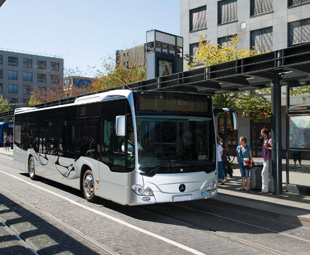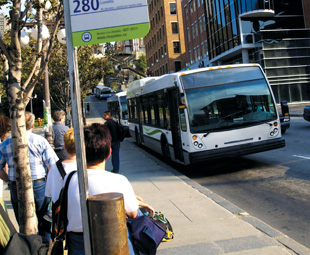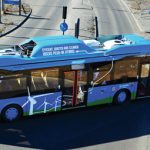Where are the academics?

In the constant rat race that is life, we need to rethink the way we get around … Education is the name of the game, says VAUGHAN MOSTERT.
As a society we need to be aware of three important facts … First, cars are a very inefficient way of using limited road space, and creating more space is very expensive.
Second, if a community overspends on private vehicles, there will be less money left over for baked beans, blankets and bricks. That means less work for everyone, including the freight industry.
And third, all South Africans need to understand that regular use of public transport has to be a lifelong option for most of us, and not only for getting to the daily grind. The earlier we accept this as part of our collective mindset the easier it will be further down the line.
Unfortunately South Africa’s education system routinely fails to produce people who know much about public transport, making the community easy prey for those who are pushing an anti-public transport agenda.
Let’s start with our universities. Not one business school or MBA programme in the country seems to include public transport as an option. Some MBA candidates do a mini-thesis on the subject, but a trawl of the various university websites shows that their efforts are of little consequence. They deal with isolated topics such as taxis in Tembisa, commuter rail in Cape Town and bus fares in Benoni. This type of “research” is useless … .
Don’t expect any input from the National Research Foundation (NRF), either. Its website provides a list of over 2 000 “rated researchers” whose areas of specialisation range from the history of bubble gum to advanced kite flying, but not one of them is a “public transport” researcher. Nor do any of the academic studies listed on the NRF website deal incisively with the problems of public transport from an integrated perspective.
And academics like to boast of their collaboration, alliances and partnerships with industry … but there is a risk that such “alliances” could go a step too far. Thankfully we don’t, yet, have a Transnet professor of railways or a South African Airways professor of airlines, but the potential for such unholy alliances exists. How about a South African National Taxi Council (Santaco) professor of minibus-taxis?
However, South Africa’s top-ranked University of Cape Town (UCT) supported the e-tolling of Gauteng’s freeways, claiming that for every rand spent, motorists will receive benefits worth eight rand. Early last year, UCT also advertised a position known as the Sanral Chair in Transport Planning and Engineering. The post has never been filled – and the advertisement was withdrawn soon thereafter.
The front page of the Sunday Times of November 25, 2012, described a “cosy club” of transport engineers dominating toll roads. It described this club as being well-connected within government, and pointed out that critics of its schemes are “reluctant to criticise economically unsound decisions … fearing that they will be excluded from further deals worth billions”.
 These deals don’t only relate to construction contracts, but include government largesse to many academic institutions in the form of bursaries to students, training courses, funding of mickey-mouse “research” institutes, sponsorship for journal articles and irrelevant conferences. No academic institution would like to be excluded from such deal-making, but the self-censorship which results leads to academic mediocrity.
These deals don’t only relate to construction contracts, but include government largesse to many academic institutions in the form of bursaries to students, training courses, funding of mickey-mouse “research” institutes, sponsorship for journal articles and irrelevant conferences. No academic institution would like to be excluded from such deal-making, but the self-censorship which results leads to academic mediocrity.
The few universities that teach transport economics tend to focus mainly on logistics. The movement of people, and the costs involved, receive virtually no attention. Even at certificate and diploma level, transport courses allow students to “specialise” in either freight or passenger studies. This is a mistake. All freight students need some exposure to passenger issues as an integral part of their freight course.
Furthermore, every academic institution should be offering a basic course in public transport and road management, which should also be routinely available as part of the arts and the humanities. Seeing that the church has, quite rightly, become involved and that the legal profession is now regularly being called on to adjudicate the chaotic state of transport funding and planning, even our theology and law programmes should include some urban transport economics!
Now we need to drop further down the education chain – to primary school level. In the same way that people need to learn indigenous languages at the earliest possible stage, everyone should be exposed to good urban public transport very early in their lives, so that a lifelong transit riding habit can be cultivated among the majority of the population.
Sadly, most of our scholars get to school by walking (which in itself has become a hazardous exercise) or by “mom’s taxi” or by special taxi shuttles, which have had their share of bad accidents. None of these expose children to normal public transport.
The problem gets worse at university level, with at least three universities (UCT, University of Johannesburg and the University of the Witwatersrand) cosseting their students by offering “free” shuttle services between residences and campuses. While good reasons may exist for providing some dedicated services, a negative consequence of this practice is that most students leave university without a clue about normal public transport and immediately join the ranks of car users when they start their careers.
The academic world should rather be pressuring local authorities to fix public transport all over the city and then give students a bus or train pass as part of their semester fee.
Unfortunately we are mostly in focused denial – our “educated” population is unwilling to apply its mind to solving these problems. Everyone wants to be an engineer, doctor, accountant, entrepreneur, or whatever, and we are all eager to study strategy, law, finance, human resources, communication and information technology to achieve these goals, but most of us don’t know where the nearest bus stop is. Nor do we want to know how much our cars are costing us … We need to be told that the South Africa’s work commute is costing us nearly R200 billion, and that doing it by car is four times more expensive than doing it by public transport.
Our ignorance has turned us into a “transport-stupid” society, which is one of the reasons why we now sit with the e-toll problem. We have to stop sucking up nonsense like “cars are good for the economy” and “a good road network creates wealth”. Maybe it does, for the car and road construction industry, but not necessarily for the broader community.
The academic community prides itself on its social role in the community. Here is an opportunity for it to start becoming part of the solution rather than being part of the problem.
Vaughan Mostert is a senior lecturer in the Department of Transport and Supply Chain Management at the University of Johannesburg. He developed a love for public transport early in life, which led to a lifelong academic interest in the subject. Through Hopping Off, Mostert leaves readers with some parting food for thought as he continues his push for change in the local public transport industry.
Published by
Focus on Transport
focusmagsa



